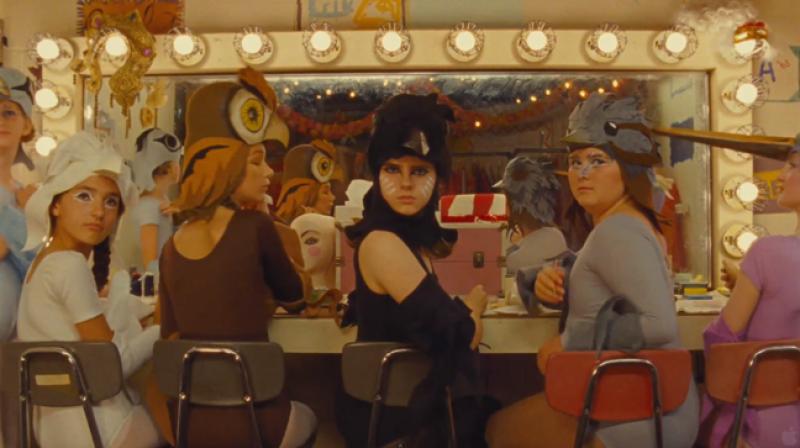Moonrise Kingdom | reviews, news & interviews
Moonrise Kingdom
Moonrise Kingdom
Wes Anderson returns with stars aplenty in this meticulous portrait of young love

With its precocious youngsters, enchanting title, wonderful wit and delight in hand-crafted detail, Moonrise Kingdom is every inch a Wes Anderson film. This year’s Cannes opener is steeped in The Royal Tenenbaums’ director’s faux-naïf, frivolous worldview, with nearly every one of its magical frames carrying his signature.
Scripted by Anderson and Roman Coppola, Moonrise Kingdom might boast an all-star adult cast but its protagonists are two 12-year-old delinquents. Set on the fictional island of New Penzance in 1965, it sees made-for-each-other misfits Suzy Bishop and Sam Shakusky (newcomers Kara Hayward and Jared Gilman) meet when Sam flees his Khaki Scout troop and stumbles into the dressing room of a church play where Suzy is dressed as a raven (pictured below right).
 They’re certainly a couple of queer birds: he’s an orphan and excellent marksman, she’s a loner who occasionally goes “berserk”. She looks out through meticulously made-up eyes, viewing the world up close via ever-present binoculars, but she’s detached from the day-to-day. Suzy finds her parents’ book called Coping with the Very Troubled Child and escapes into a world of fantasy stories which she liberates from the local library, while Sam is unceremoniously dumped by his foster family and tormented by his peers.
They’re certainly a couple of queer birds: he’s an orphan and excellent marksman, she’s a loner who occasionally goes “berserk”. She looks out through meticulously made-up eyes, viewing the world up close via ever-present binoculars, but she’s detached from the day-to-day. Suzy finds her parents’ book called Coping with the Very Troubled Child and escapes into a world of fantasy stories which she liberates from the local library, while Sam is unceremoniously dumped by his foster family and tormented by his peers.
The film seditiously cheers on these two young lovebirds as they make a break for freedom: him through a hole in the side of his tent at Camp Ivanhoe; her from her family home. And so the hunt is on to find these fugitives. It’s led by “sad, dumb policeman” Captain Sharp (Bruce Willis, pictured below left with Murray, Swinton and Norton) who is accompanied by the terribly earnest Scout Master Ward (Edward Norton, pictured overleaf) and Suzy’s lawyer parents, Laura (Frances McDormand) and Walt (Bill Murray). Following is a matronly woman known only as Social Services (Tilda Swinton) who sweeps in, in a royal blue cape like a glamorous cross between Thatcher and Dracula. There are also cheering appearances from Anderson stalwart Jason Schwartzman, playing the hilariously irresponsible Cousin Ben, Harvey Keitel as scouting big cheese Commander Pierce and Bob Balaban as our island guide/narrator.
 Moonrise Kingdom has that unmistakable Anderson attention to detail but this time round there’s a more faded, lived-in aesthetic as if some of the colour has come out in the wash. It’s unusual for an Anderson film to be set in a specific time period but the era suits his retro style and the film visually emulates some of the lower-budget movies of the period, particularly those from the French New Wave, with which it shares an anarchic spirit. Throughout Anderson’s films – from Bottle Rocket (1996) to Fantastic Mr Fox (2009) - he’s made nods to the work of other auteurs, especially the tonally similar films of Hal Ashby. Moonrise Kingdom’s specific points of reference include Loach’s Black Jack (1979), Waris Hussein’s Melody (1971) and Truffaut’s Pocket Money (1976), while Godard’s Pierrot le Fou (1965) seems to be in there too. Fittingly, these days Anderson himself is an inspiration - the recent Submarine being a prime example.
Moonrise Kingdom has that unmistakable Anderson attention to detail but this time round there’s a more faded, lived-in aesthetic as if some of the colour has come out in the wash. It’s unusual for an Anderson film to be set in a specific time period but the era suits his retro style and the film visually emulates some of the lower-budget movies of the period, particularly those from the French New Wave, with which it shares an anarchic spirit. Throughout Anderson’s films – from Bottle Rocket (1996) to Fantastic Mr Fox (2009) - he’s made nods to the work of other auteurs, especially the tonally similar films of Hal Ashby. Moonrise Kingdom’s specific points of reference include Loach’s Black Jack (1979), Waris Hussein’s Melody (1971) and Truffaut’s Pocket Money (1976), while Godard’s Pierrot le Fou (1965) seems to be in there too. Fittingly, these days Anderson himself is an inspiration - the recent Submarine being a prime example.
 Moonrise Kingdom is also haunted by the ghosts of Anderson’s past, which both works in its favour and to its detriment. His previous films are evoked throughout, binding them all unmistakably together as an oeuvre and providing satisfying recognition for fans. As the camera seamlessly explores the fastidiously decored Bishop home we’re reminded of the Tenenbaum’s townhouse, Steve Zissou’s ship, or Mr. Fox’s den. Kara Hayward’s doe-eyed detachment and sorrowful speech recalls Gwyneth Paltrow’s terrific turn as Margot Tenenbaum. Myriad other features reoccur including the portable record player, the tents, the final act of destruction and Bill Murray’s romantic misery and increasingly dishevelled despondency
Moonrise Kingdom is also haunted by the ghosts of Anderson’s past, which both works in its favour and to its detriment. His previous films are evoked throughout, binding them all unmistakably together as an oeuvre and providing satisfying recognition for fans. As the camera seamlessly explores the fastidiously decored Bishop home we’re reminded of the Tenenbaum’s townhouse, Steve Zissou’s ship, or Mr. Fox’s den. Kara Hayward’s doe-eyed detachment and sorrowful speech recalls Gwyneth Paltrow’s terrific turn as Margot Tenenbaum. Myriad other features reoccur including the portable record player, the tents, the final act of destruction and Bill Murray’s romantic misery and increasingly dishevelled despondency
Where Rushmore (1998) perfectly balanced the portrayal of kids with an exploration of adult characters, Moonrise Kingdom focuses on the kids at the expense of the adults, whose characters drift sometimes unsatisfactorily in the background (a love triangle, for instance, is barely even touched upon). The two young leads are extremely likeable but lack screen confidence. Furthermore, this group of actors are slightly less successful at tailoring their performances to Anderson’s offbeat, nonchalant style than previous starry ensembles. Willis in particular is a little uneven, though Norton stands proud as the inept and sweetly bemused Scout Master Ward.
Anderson’s seventh feature is an adorable romantic fantasy with a deft blend of sincerity and playfulness. It’s heartachingly gorgeous with ample knockabout charm but, wit and visuals aside, unfortunately it’s not up there with his finest. Despite this, in troubled times, his child’s-eye-view is to be savoured. As the Swiss philosopher Henri Frédéric Amiel once said, “Blessed be childhood, which brings down something of heaven into the midst of our rough earthliness.”
Follow @EmmaSimmonds on Twitter
Watch the trailer for Moonrise Kingdom
rating
Explore topics
Share this article
The future of Arts Journalism
You can stop theartsdesk.com closing!
We urgently need financing to survive. Our fundraising drive has thus far raised £49,000 but we need to reach £100,000 or we will be forced to close. Please contribute here: https://gofund.me/c3f6033d
And if you can forward this information to anyone who might assist, we’d be grateful.

Subscribe to theartsdesk.com
Thank you for continuing to read our work on theartsdesk.com. For unlimited access to every article in its entirety, including our archive of more than 15,000 pieces, we're asking for £5 per month or £40 per year. We feel it's a very good deal, and hope you do too.
To take a subscription now simply click here.
And if you're looking for that extra gift for a friend or family member, why not treat them to a theartsdesk.com gift subscription?
more Film
 Can I get a Witness? review - time to die before you get old
Ann Marie Fleming directs Sandra Oh in dystopian fantasy that fails to ignite
Can I get a Witness? review - time to die before you get old
Ann Marie Fleming directs Sandra Oh in dystopian fantasy that fails to ignite
 Happyend review - the kids are never alright
In this futuristic blackboard jungle everything is a bit too manicured
Happyend review - the kids are never alright
In this futuristic blackboard jungle everything is a bit too manicured
 Robert Redford (1936-2025)
The star was more admired within the screen trade than by the critics
Robert Redford (1936-2025)
The star was more admired within the screen trade than by the critics
 Blu-ray: The Sons of Great Bear
DEFA's first 'Red Western': a revisionist take on colonial expansion
Blu-ray: The Sons of Great Bear
DEFA's first 'Red Western': a revisionist take on colonial expansion
 Spinal Tap II: The End Continues review - comedy rock band fails to revive past glories
Belated satirical sequel runs out of gas
Spinal Tap II: The End Continues review - comedy rock band fails to revive past glories
Belated satirical sequel runs out of gas
 Downton Abbey: The Grand Finale review - an attemptedly elegiac final chapter haunted by its past
Noel Coward is a welcome visitor to the insular world of the hit series
Downton Abbey: The Grand Finale review - an attemptedly elegiac final chapter haunted by its past
Noel Coward is a welcome visitor to the insular world of the hit series
 Islands review - sunshine noir serves an ace
Sam Riley is the holiday resort tennis pro in over his head
Islands review - sunshine noir serves an ace
Sam Riley is the holiday resort tennis pro in over his head
 theartsdesk Q&A: actor Sam Riley on playing a washed-up loner in the thriller 'Islands'
The actor discusses his love of self-destructive characters and the problem with fame
theartsdesk Q&A: actor Sam Riley on playing a washed-up loner in the thriller 'Islands'
The actor discusses his love of self-destructive characters and the problem with fame
 Honey Don’t! review - film noir in the bright sun
A Coen brother with a blood-simple gumshoe caper
Honey Don’t! review - film noir in the bright sun
A Coen brother with a blood-simple gumshoe caper
 The Courageous review - Ophélia Kolb excels as a single mother on the edge
Jasmin Gordon's directorial debut features strong performances but leaves too much unexplained
The Courageous review - Ophélia Kolb excels as a single mother on the edge
Jasmin Gordon's directorial debut features strong performances but leaves too much unexplained
 Blu-ray: The Graduate
Post #MeToo, can Mike Nichols' second feature still lay claim to Classic Film status?
Blu-ray: The Graduate
Post #MeToo, can Mike Nichols' second feature still lay claim to Classic Film status?

Add comment